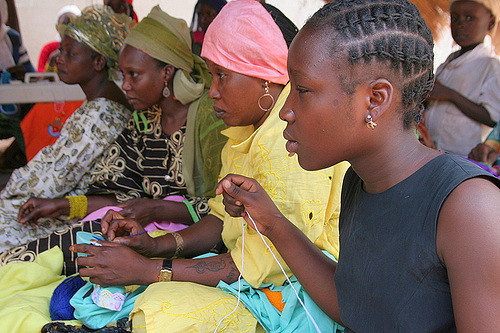Blog by Ruth Mlanga, Oxfam Private Sector Policy Advisor
Over a year in, the Sustainable Development Goals (SDGs) show no sign of losing momentum. Ruth Mhlanga reflects on how businesses can support the SDGs to create a world free from poverty without breaking the planet.
The SDGs are ambitious, but in a world where 8 men have the same wealth as the poorest half of the world, nothing less would suffice. It is a good thing then, that many in the private sector have stepped up and embraced the goals. But despite some refreshing exceptions, private sector engagement has, to date, overwhelmingly focused on potential business opportunities, without an equivalent focus on responsible conduct and impact. If this approach continues, we run the risk of not meeting the SDGs and, even worse, business conduct may actively undermine their attainment. Having business on side in this ambitious vision is a great starting point, but what are some of the ways business can engage better with the SDGs in practice?
Beginning with Impact
Nobody likes to talk about what they don’t do well, but this is the depth of character required for the SDGs. It’s almost too obvious to state, but good business engagement with the SDGs is predicated on responsible business conduct, including increased efforts to implement the UN Guiding Principles on Business and Human Rights. It should go without saying that harm caused in one area of a company cannot be offset by a social project elsewhere. Businesses can (knowingly or not) deplete natural resources, sustain practices that keep women marginalised, or promote weaker regulation that would otherwise protect the most vulnerable people. Mapping and understanding these dynamics is crucial and knowing your overall impact has to be a key starting point.
Avoid Cherry Picking
Companies should avoid cherry picking goals which maximise their profits while avoiding those which have a negative impact. Take for instance, an energy company choosing to focus on Goal 7, Affordable and Clean Energy, but not Goal 13, Climate Action. This could result in the re-purposing of dirty energy under the guise of energy access and the undermining of both goals.
To date, much of the business conversation has focused on where business can aid the goals whilst increasing profits. But win-win scenarios alone will not get us where we need to be. For example, in addressing problems like economic inequality, positive actions to increase prices paid to farmers, workers’ wages and due taxes paid, soon impact on the financial bottom line of a company. However, to meet the SDGs there will need to be a shift in approach to costs being minimised no matter what even if they contribute to public goods. Similarly, tackling the challenge of climate change properly could mean the end of some companies in their current form altogether.
Changing Business Models
The SDGs present a more radical agenda than most business leaders realise because they require new ideas for how the global economy can work for everyone – not only the privileged few. Not only should companies engaging with the SDGs look at their entire footprint on the SDGs, they should also be ready to work towards a more human economy, where businesses show as much concern for workers, communities and the planet as they do for their shareholders and board members. The omnipresent pressure to create short-term value for shareholders is a key obstacle for companies to overcome in order to do more good . A growing number of initiatives are experimenting with alternative business models, such as social enterprises, employee-owned companies or producer-owned cooperatives. Their success is challenging the status quo in the purpose and governance structures of corporations, and could form founding blocks of a more human economy.
What about regulation?
Perhaps even less popular than talking about negative impacts is calling for increased governmental regulation. However, in this new SDG era, where business has underwritten the importance of a sustainable future for people and the planet, the idea that regulation for the public good is anti-business seems increasingly anachronistic. It flows then, that responsible business should actively support governance in pursuit of the SDGs. Sustainability leaders will be those who support government efforts to govern for the common good, and are willing to stand up to peers who undermine these collective efforts.
A healthy planet, where no-one is left behind
For companies claiming to contribute to the SDGs, the bar is set high – but we have no other choice. The gap to bridge is large and the time is short. For business to truly contribute to the achievement of the SDGs, a fundamental rethink is required of the role of business in society.
Instead of taking a narrow, short-term and profit-focused approach in much of the current discourse, companies should base their engagement on their own impacts, align their core business strategies with the SDGs and work with others towards a system-level change and a more human economy. Luckily, a growing amount of business leaders are realising this, but it is high time for the rest of the private sector to follow and translate this into real and tangible action.


